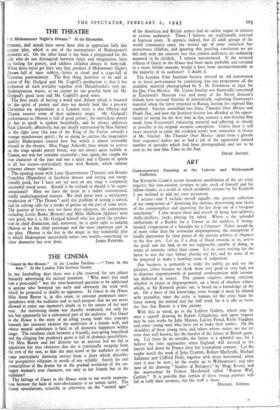THE CINEMA IN my footballing days there was a jibe
reserved for any player blatantly advertising his tactical intention. " Why don't you send him a post-card? " was the time-honoured question to be addressed to anyone who betrayed too early and obviously the trick with which he proposed to diddle an opponent. In Guest in the House Miss Anne Baxter is, in this sense, in constant premature corre- spondence with the audience and to such purpose that we are never allowed to enjoy one moment's doubt as to the nature of her next ruse. An interesting theme was thereby weakened, not only for me, but apparently for a substantial part of the audience. For Guest in the House is the story of an ailing young lamb who conceals beneath her innocent exterior the ambitions of a female wolf, and whose mental unbalance is fatal to all domestic happiness within range. The resultant clash between a friendly, easy-going household and the clinging but predatory guest is full of dramatic possibilities. Yet Miss Baxter and her director are so anxious lest we fail to appreciate her true character that she is continually escaping from the rest of the cast, so that she may scowl at the audience or read some particularly damning extract from a diary which describes her prospective villainies in words of one syllable. Surely the real potentialities of the drama lay in the gradual revelation of the un- happy woman's true character, not only to her friends but to the audience?
The failings of Guest in the House seem to me worth examina- tion because the fault of over-obviousness is no screen rarity. The recent speculations, scientific or otherwise, on the "mental ages" of the American and British armies had an earlier vogue in relation to cinema audiences. These, I believe, are traditionally assessed at fourteen years. It appears, indeed, that all adult groups of the world community enjoy the mental age of some statistical but anonymous children, and ignoring this puzzling conclusion we are left only with the concrete fact that cinema audiences are ordinarily assumed to be childish. I remain unconvinced. If the tortured villainy of Guest in the House had been more probable and revealed in a more lifelike manner, would it have been incomprehensible to the majority of its audience? I doubt it.
The London Film Institute Society revived an old controversy at its latest performance by combining into one programme all the available material photographed by S. M. Eisenstein in 1932 for his Que Viva Mexico. Mr. Upton Sinclair was financially concerned in Eisenstein's Mexican visit and many of the Soviet director's friends have accused Sinclair of inartistically exploiting Eisenstein's material when the latter returned to Russia, leaving his exposed film unedited. Sinclair assembled two films, Thunder Over Mexico and Death Day, and now the Institute Society has afforded us the oppor- tunity of seeing for the first time in this country a non-Sinclair film made from Eisenstein's remaining material and adhering as closely as possible to his original scenario conception. Unless there is still more material to come the evidence seems now somewhat in favour of Mr. Sinclair. His Thunder Over Mexico (apart from a ghastly final sequence) makes not so bad a job of the apparently limited number .of episodes which had been photographed, and are to be seen in the new film Time in the Sun.
EDGAR ANSTEY.


























 Previous page
Previous page